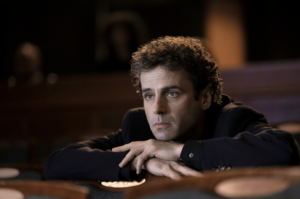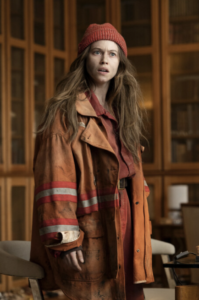Is there anything quite like ballet? The answer, quite simply, is no, but that doesn’t mean that there aren’t many audiences and critics who are skeptical and quite uneducated about the art form. They misunderstand the amount of dedication, amount of time, and amount of astonishing strength it takes to even be considered in a company of dancers as prestigious as the two at the center of Amy Sherman-Palladino and Dan Palladino’s magnificent series, Étoile. This new series is all about tension but also survival. These artists can’t help but express their passion, rage, and joy through movement, but with the arts now under constant attack, Étoile is as ravishing as it feels radical.
How do you honor the tradition of the tutu while also bringing new eyeballs onto one of the oldest, most celebrated forms of dance? Still feeling the ticket sales struggle from COVID and the indifference from those who prefer to doom scroll on TikTok, the artistic directors from two of the world’s more premiere dance institutions hatch a plan. Luke Kirby’s Jack McMillan, from New York’s Metropolitan Ballet, and Charlotte Gainsbourg’s Geneviève Lavigne, of Paris’ Lea Ballet Nationale, join forces to propose an exciting experiment for their upcoming respective seasons: they swap their top talent and each company will witness how both cities train and respect their top talent.
The change in talent creates immense buzz for those in the know, but the adjustments lead to various dramas backstage. Gideon Glick’s Tobias, a particular and enigmatic choreographer, can’t find the right toothpaste or shampoo in France. Is he eccentric or incapable of focusing on anything but his new combinations and movement? His large headphones are either over his ears or cradling his neck, and Glick is perfectly at home in this world. Since he first dipped a toe in the Sherman-Palladino and Palladino world as magic-is-magic magician in The Marvelous Mrs. Maisel, his immediately taps into the beloved rhythms from these creators, and he exemplifies how the zoomy-tip-tap nature of the dialogue can be felt and showcased in a performer’s body.

Of the new additions to the stateside company, there is no one quite like Lou de Laâge’s Cheyenne Toussaint. Jack was most insistent that she join the Metropolitan’s ranks when she would rather take down those responsible for destroying the environment. She could dance or not dance, but everyone wants witness her otherworldly gifts. Her presence radiates so much all at once: she is a star but also a teacher and an activist. Cheyenne stalks the halls of the New York institution, her brow often furrowed or her mouth agape as she insists that what she needs and wants is much more important that what you think you need or want. She is a diamond in the rough, and she creates one of the most singular characters you’ve ever seen. Cheyenne is not simply headstrong, “rough around the edges,” or difficult–she is joyously everything at the same time. And she knows her worth. When Gael, a dancer-turned farmer-and turned back into a dancer portrayed by David Alvarez, tells her that they need to rehearse, she barks back, “You rehearse–I’m perfect!”
Are Cheyenne and Tobias challenging the traditions of ballet, or are they its bright, shining future?
Both Jack and Geneviève assume that the swap will create enought buzz to stave off their individual problems, but they have more in common with each other even if their separate companies are halfway around the world with one another. Temperaments flare from perfomers and board members alike, and then there is the balancing of artisitic freedom with making sure there is enough money in the bank. A wealthy investor, Crispin Shamblee, is, after all, footing the bill for the entire enterprise, but Jack doesn’t want his jewel of a theater to be associated with someone whose money comes from nefarious deeds. “He is a soil raper, and he spoke at Rush Limbaugh’s funeral,” he exclaims when Geneviève pitches the idea in the pilot.

Kirby remains easy throughout the entire eight episodes, but he percolates in every scene. Ballet is about control, but Jack struggles to know when to loosen and tighten his grip. After winning an Emmy for his remarkable performance as Lenny Bruce in Maisel, Kirby has built someone in search of constant beauty while infusing Jack with an elusive sadness. Gainsbourg always engages for how light she is on her feet–not just because Geneviève hates wearing shoes and kicks them off whenever she steps inside–but also when she pivots without grace. She’s wonderful. Ivan du Pontavice’s Gabin, a bad boy of ballet desperate to be taken seriously, shares a reserved spark with Glick’s Tobias.
Every single show created by the Palladino’s has been revered for its rich dialogue and how their characters speed through their words, and while that is recognizable in Étoile, it feels even more refined and sophisticated. It’s like these dancers (and everyone, really) have imbibed each script and they are allowing the words to be extended through each battement or arabesque. Cinematographer M. David Mullens shares the stage and lights the performance equisitely, as if we are a member of the company. If you watch each premiere of Maisel, you will see how he captures each of Midge’s sets in a brand new way, and every dance performance in this series has a life of their own.
After all of these years, is ballet misunderstood? When you take something from an audition to a rehearsal hall to a storied theater, you gift a performance with respect, and that is what Sherman-Palladino and Palladino have done with Étoile. It’s passionate and elegant, and it ensures that true expression will never die. It’s worth fighting for.
Étoile is streaming now on Prime Video.









